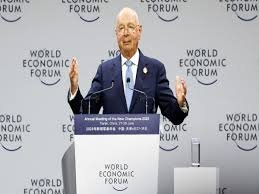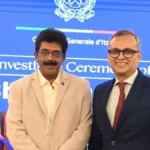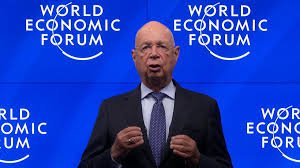Klaus Schwab Steps Down from Executive Role at WEF
Transition to New Governance Structure Klaus Schwab, the founder and long-time executive chairman of the World Economic Forum (WEF), will transition from his executive role to become the chairman of the board of trustees by January next year. This change marks a significant shift in the organization’s governance, moving from a founder-led structure to a more distributed leadership model where the president and the managing board will assume full executive responsibilities. The WEF’s statement emphasized this transition as a planned “governance evolution.”
Significance of Schwab’s Legacy Klaus Schwab founded the WEF in 1971 with a vision to create a platform for global leaders to collaborate on major issues facing the world. The annual Davos meetings have become iconic, attracting political, business, and societal leaders to discuss and address global challenges. Under Schwab’s leadership, the WEF has significantly influenced global economic and political discourse, setting the stage for numerous high-impact initiatives and partnerships.
Addressing Criticisms and Evolving Themes Despite its prominence, the WEF has faced criticism for its perceived elitism and environmental impact due to the carbon footprint of the annual gatherings. In response, recent forums have increasingly focused on sustainability and immediate global crises. For instance, the 2023 theme “Cooperation in a Fragmented World” highlighted urgent issues like economic instability, energy crises, and food security, urging leaders to adopt sustainable and cooperative approaches.
Impact on Future Leadership With Schwab stepping back, the WEF is poised for a new era of leadership. The incoming president and managing board are expected to carry forward Schwab’s vision while adapting to the evolving global landscape. This change in leadership is anticipated to bring fresh perspectives and strategies to the forum’s ongoing efforts in addressing global issues through multilateral cooperation and innovative solutions.

Why This News is Important
Implications for Global Governance The transition in WEF’s leadership is a pivotal moment for global governance. As one of the most influential platforms for international cooperation, changes in its leadership structure could impact how global issues are addressed. This news is particularly relevant for students preparing for exams related to international relations, governance, and public administration, highlighting real-world examples of leadership transitions and their potential effects on global policies.
Relevance to Economic and Political Studies Klaus Schwab’s move to the board of trustees represents a significant organizational shift in one of the most important economic forums worldwide. This transition provides a practical case study of leadership evolution in global institutions, making it pertinent for students in economics and political science. Understanding the WEF’s role and influence helps contextualize many current global economic policies and trends discussed in competitive exams.
Focus on Sustainability and Criticisms The WEF’s response to criticism about its elitism and environmental impact underscores the growing importance of sustainability in global discourse. For exam aspirants, this is a key example of how major organizations are adapting to societal pressures and shifting towards more sustainable practices. This news can serve as a reference point for questions related to environmental policies and sustainable development.
Real-World Example of Strategic Leadership For those preparing for leadership roles in public service or corporate sectors, Schwab’s transition offers insights into strategic leadership and governance evolution. It demonstrates how visionary leaders adapt their roles to foster organizational growth and sustainability, a critical concept in management studies and public administration.
Insight into Organizational Dynamics This transition is also a study in organizational dynamics and governance, crucial for aspirants of civil services and management positions. Understanding the WEF’s structural changes can provide valuable lessons on managing and leading large, influential organizations, which is often a topic in various competitive exams.
Historical Context
Founding of the World Economic Forum The World Economic Forum was founded in 1971 by Klaus Schwab as a non-profit organization based in Geneva, Switzerland. Originally known as the European Management Forum, it was renamed in 1987 to reflect its global reach. The forum is best known for its annual meeting in Davos, Switzerland, which brings together political, business, and civil society leaders to discuss and address pressing global issues.
Growth and Influence Over the decades, the WEF has grown in influence, becoming a key player in shaping global economic policies and fostering international cooperation. Its meetings have facilitated numerous high-profile initiatives and collaborations, cementing its role as a crucial platform for dialogue on global challenges such as climate change, economic inequality, and technological advancement.
Criticism and Adaptation Despite its success, the WEF has not been immune to criticism. Accusations of elitism and a substantial carbon footprint due to the annual Davos meetings have been persistent. In response, the forum has increasingly incorporated themes of sustainability and inclusivity in its agenda. Recent years have seen a stronger focus on addressing immediate global crises and promoting sustainable practices.
Schwab’s Vision and Leadership Klaus Schwab’s leadership has been instrumental in the WEF’s development. His vision of creating a collaborative platform for global leaders has significantly impacted international relations and economic policies. Schwab’s ability to adapt the forum’s focus to emerging global issues has been a hallmark of his tenure, ensuring the WEF’s relevance in a rapidly changing world.
Key Takeaways from Klaus Schwab’s Transition at WEF
| Sr. No. | Key Takeaway |
|---|---|
| 1 | Klaus Schwab to step down as executive chairman of WEF. |
| 2 | Transition to a new governance structure by January. |
| 3 | Shift from founder-led model to distributed leadership. |
| 4 | Focus on sustainability and immediate global crises. |
| 5 | Schwab’s legacy includes founding WEF and shaping global discourse. |
Important FAQs for Students from this News
1. What is the World Economic Forum (WEF)?
- The World Economic Forum is a Swiss nonprofit foundation, established in 1971 by Klaus Schwab, aimed at improving the state of the world by engaging business, political, academic, and other leaders of society to shape global, regional, and industry agendas.
2. Why is Klaus Schwab stepping back from his executive role at the WEF?
- Klaus Schwab is stepping back from his executive role to transition to a new phase of leadership at the WEF. This move allows for a new generation of leaders to take on key responsibilities within the organization.
3. How has Klaus Schwab’s leadership influenced the WEF?
- Klaus Schwab’s leadership has been instrumental in shaping the WEF’s agenda, focusing on issues such as globalization, stakeholder capitalism, and sustainable development. His vision has guided the organization’s initiatives for over five decades.
4. What challenges does the WEF face amid Schwab’s transition?
- The WEF faces challenges in maintaining its relevance and impact in a rapidly changing world characterized by geopolitical tensions, technological advancements, and societal shifts. Schwab’s transition prompts reflection on the future direction of the organization.
5. Will Klaus Schwab continue to be involved with the WEF?
- Yes, Klaus Schwab will continue to play an active role in shaping the WEF’s agenda as its founder and executive chairman, despite stepping back from his executive role. His continued involvement underscores his commitment to advancing global cooperation and sustainable development.
Some Important Current Affairs Links

















